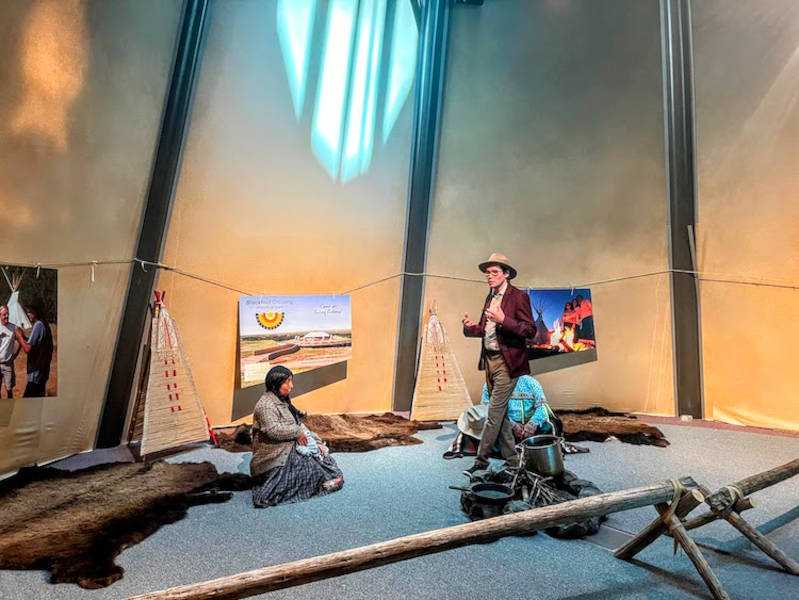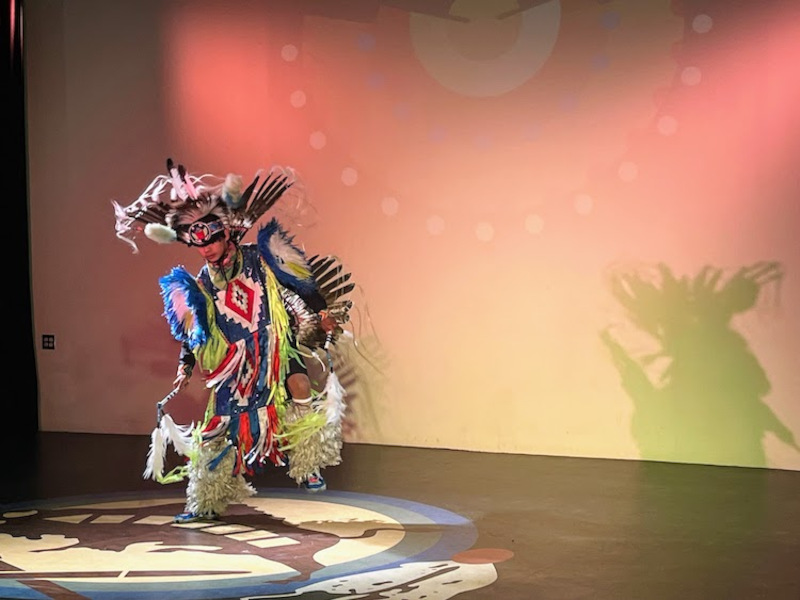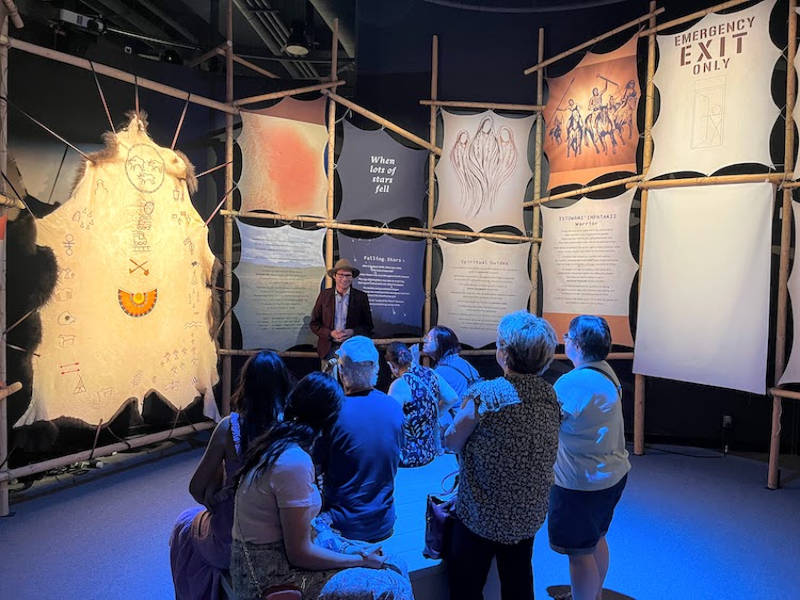About one hour’s drive east of Calgary, Alberta is Canada’s second largest First Nations Reserve, home to the Siksika Nation. Situated on these lands lies a place where history comes alive, where the stories of Indigenous peoples are woven into the fabric of the land itself. Blackfoot Crossing Historical Park is an immersive journey into the heart of Blackfoot culture and heritage. The historical park sits on land that has been a meeting place for Indigenous Peoples for thousands of years, the cultural and geographic center of Blackfoot territory, and the place where Treaty 7 was signed in 1877. As I ventured into this designated National Heritage Site, I found myself transported to a world where traditions, tales, and the spirit of a resilient people converge.
Joining me at Blackfoot Crossing was Shilo Clark, a proud member of the Siksika Nation who has worked at the historical park for many years and in many roles – cataloging artifacts, guiding tourists through the museum, and now working in museum communications. “We opened in 2007 and throughout that time we have had many many people come through,” he explained. “The museum has changed hands from different manager to different manager, but the spirit and intent of this place has always stayed the same. That is to educate and help people understand more about the Blackfoot People, our cultures, traditions, and most of all our history.”

Photo by Kelsey Olsen.

Photo by Kelsey Olsen.
As I sat down in the Miiksika’am (Red Crane) Theatre, I listened to Clark share a land acknowledgment to express gratitude to those whose territory we reside on. Following this, two young Blackfoot youth took the stage to perform traditional dances, the Jingle Dance and the Chicken Dance. The rhythmic drum beats echoed through the theatre and each step and gesture was a poignant reminder of the beauty and significance of preserving these traditional art forms – one of the very reasons that Blackfoot Crossing Historical Park was created.
Related: Thinking of traveling to Calgary? Take a day trip to Yamnuska Wolfdog Sanctuary while in the area. For more information read our post: Yamnuska Wolfdog Sanctuary – A Howling Adventure Near Calgary
Unraveling Stories Through Artifacts
With so much to see, I continued for a tour of the exhibits with Clark as a knowledgeable guide. His deep understanding of Blackfoot history and culture brought the exhibits to life in ways I could never have imagined. With every artifact and display, Clark unraveled intricate stories of the Blackfoot people, sharing anecdotes, legends, and personal insights that made the past feel vividly present. One specific legend he shared was about Napi, the troublemaker, and the Big Rock. The legend was to teach children that if you give something to somebody you can’t take it back.
Several weeks later, I was reminded of this legend on a family road trip. We made a stop at the Okotoks Erratic (Big Rock), which is located about 100 km southeast of the Siksika Reserve and the Historical Park. Here, I heard the same legend of Napi and the Big Rock, this time with subtle differences. I was reminded of the power of storytelling in Indigenous cultures, where narratives are not simply tales but living entities that evolve with each retelling.

Photo by Kelsey Olsen.
Future of Blackfoot Crossing Historical Park
Blackfoot Crossing Historical Park has many exciting things on the horizon. The park has concluded its first season of successful tipi camping which will commence again in the summer of 2024. “We also are planning to build an amphitheater large enough to seat around 20,000-30,000 guests. So that one day we can put on massive outdoor powwows here.” Clark explained. These exciting new developments will further enrich the already expansive park.
A visit to Blackfoot Crossing Historical Park is a testament to the importance of preserving Indigenous history and sharing it with the world, allowing visitors like me to gain a deeper understanding of the cultures that have shaped the land we stand on today. My visit was evidence that history is not a fixed chapter in a book, it’s a narrative carried forward by those who cherish and share it.

Photo by Kelsey Olsen.
Plan Your Visit
Location: P.O. Box 1639, Siksika, AB, T0J 3W0
Website: https://blackfootcrossing.ca/wordpress/
Getting there: Travel East from Calgary on Highway 1 for 100 kilometers, and then head south on Highway 842 for an additional 7 kilometers.
Rates: Adults: $22.00
Youth (8-17): $15.00
Seniors (65 Plus): $14.00
Children (7 and under): Free
Hours of Operation: Tuesday – Friday: 9 AM to 5 PM
Saturday: 10 AM to 4 PM)
Sunday: CLOSED
Monday: CLOSED

No Comments